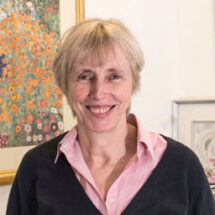
Caroline Dean will give the 2016 Max Perutz Lecture on Thursday 27th April 2017 at 11.00am in the Max Perutz Lecture Theatre at the LMB. The lecture, entitled “Antisense transcription and epigenetic switching” is open to anyone in the local area who is interested in attending.
Caroline is currently Professor and Project Leader in the Cell and Developmental Biology Department at the John Innes Centre, Norwich. Her research focuses on the timing of the transition to reproductive development in plants. This has led into detailed molecular dissection of conserved co-transcriptional and epigenetic mechanisms that enable the plant to respond to temperature signals.
In 1982, Caroline completed her PhD at the University of York. She then became a research scientist at a start-up biotech company called Advanced Genetic Sciences Inc., in Oakland, California, USA, before joining the John Innes Centre in 1988. She was elected Fellow of EMBO in 1999, Fellow of the Royal Society 2004 and foreign member of the US National Academy in 2008. She was made Dame Commander of the British Empire in the Queen’s Birthday Honours, 2016. She has won numerous awards including the Genetics Society Medal 2002; the BBSRC Anniversary Award for Excellence in Bioscience 2014; the FEBS/EMBO Women in Science Award 2015; the Royal Society Darwin Medal 2016.
Lecture abstract
What quantitatively regulates gene expression? Non-coding transcription and chromatin regulation are now seen as major factors regulating gene expression in most eukaryotic genomes. Through the study of how plants time developmental transitions, we have discovered that Arabidopsis floral repressor FLC is an excellent system in which to dissect how non-coding RNA and chromatin mechanisms regulate gene expression. FLC expression is quantitatively modulated by an antisense-mediated chromatin mechanism that coordinately influences transcription initiation and elongation. Expression is then epigenetically silenced through a cold-induced, cis-based, Polycomb switching mechanism. The talk will describe our latest understanding of these conserved mechanisms and how they have been modulated during adaptation.
Background information:
The Max Perutz Lecture is named in honour of LMB Nobel Laureate Max Perutz. It is one of a series of named lectures organised by the LMB to be given by eminent scientists from around the world. Max Perutz arrived at the Cavendish Laboratory in Cambridge in 1936, to work in the field of X-ray crystallography. This move would lead to him becoming a pioneer in the new field of molecular biology, co-founding a world-class research laboratory and developing a technique to unlock the structures of proteins. Max played a key role in the history of the LMB. He was Director of the ‘MRC Unit for Research on the Molecular Structure of Biological Systems’ when it was established in 1947; and when the unit became the MRC Laboratory of Molecular Biology (LMB) in 1962, he became its first Chairman. Max Perutz officially retired as Chairman of the LMB in 1979, having overseen the development of the MRC unit into a first class research laboratory. He died in Cambridge on 6 February 2002, aged 87.
Further references
Caroline Dean’s lab page
Max Perutz biography
Poster for the Max Perutz Lecture